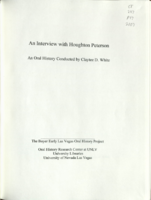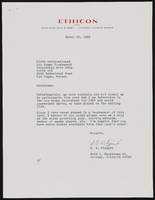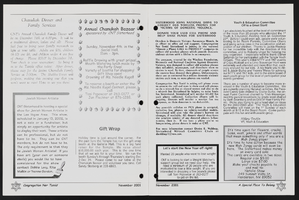Search the Special Collections and Archives Portal
Search Results

Transcript of interview with Houghton Hoot Peterson by Claytee White, May 20, 2010
Date
Archival Collection
Description
Houghton Hoot Peterson played trombone in his high school band in northern Minnesota where he grew up. That same instrument would lead him to be a member of the highly regarded Air Force jazz band called Airmen of Note after enlistment. Then during a short tour at Nellis Air Force base, Hoot decided that the Las Vegas entertainment scene might have career opportunities for him. He moved to Las Vegas in 1962, an era of celebrity performers and tourists who enjoyed the crowds and nightlife. Hoot's point of view was as a musician in the band, most often a Strip relief band. But he also has tales of famous musicians and late night jam sessions. Hoot's career spanned 20 years. Eventually the Las Vegas scene for live musicians began to change. When times got tough for Hoot, he worked as a carpenter and at a music store. In this interview he discusses his fascinating past and offers advice for today's musicians.
Text
George Stewart Personal Papers
Identifier
Abstract
The George Stewart Personal Papers (1914-2014) are comprised of military records and personal papers of George Stewart, a fifty-year Las Vegas, Nevada resident. The collection includes information about the Clark County Republican Party, Stewart's service in the United States Army Air Corps, and documents and photographs from Stewart's childhood in the Boy Scouts of America during the 1930s and 1940s. The collection also contains a personal scrapbook containing photographs, fliers, and memorabilia from his early education and military training. Stewart also collected menus and keychains from local Las Vegas, Nevada country clubs and casinos.
Archival Collection

Howard Heckethorn interview, March 2, 1977: transcript
Date
Archival Collection
Description
On March 2, 1977, Neil C. Dalmas interviewed teacher Howard Heckethorn, (born on September 14th, 1922 in St. George, Utah) at Red Rock Elementary School in Las Vegas, Nevada. This interview offers an overview of early education in Nevada. Mr. Heckethorn also discusses Stewart Ranch, Howard Hughes and the Hughes Site, and the migration of the Mormons to the Las Vegas area.
Text

Interview with Lilias Gordon, May 14, 2004
Date
Archival Collection
Description
Text

Interview with Gary Hallmark, June 24, 2005
Date
Archival Collection
Description
Text

Transcript of interview with Emma Richard Foremaster by Jamie McKee, March 20, 1978
Date
Archival Collection
Description
On March 20, 1978, Jamie McKee interviewed Emma Richard Foremaster (born 1899 in Alamo, Nevada) about her family history. Foremaster mainly discussed her ancestry, including the background of her parents and grandparents, and she did so in a pre-scripted narration-style account. Foremaster also talks about the various locations at which her family has lived, some of the recreational activities and occupations of her family, and some of the background of her own life. At the conclusion of the narration, Foremaster talks briefly about her children, her work in becoming a schoolteacher, and her appreciation for the advancements in technology as well as the love for her family and country.
Text
Transcript of interview with Hank Greenspun by Tony Bleeker, 1975
Date
Archival Collection
Description
Brief interview with Hank Greenspun by student Tony Bleeker. Greenspun speaks about changes in southern Nevada over the years, including politics, gaming and the economy. He mentions the role of the newspaper industry to provide "balance" in society.
No release form is on file for this interview. The interview is accessible onsite only, and researchers must seek permission from the interviewee or heirs for quotation, reproduction, or publication. Please contact special.collections@unlv.edu for further information.
Text



